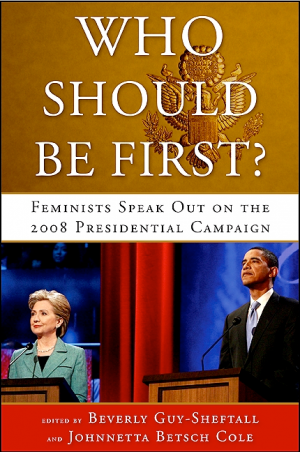Who Should Be First?: Feminists Speak Out on the 2008 Presidential Campaign

Please read this book. If you were in any way inspired by the groundbreaking 2008 election of President Barack Obama, you will find an essay in Who Should be First? that speaks what's been on your mind, challenges your way of thinking, causes you to feel frustrated, or represents the many complex emotions you felt on that historic day.
Bravo to Beverly Guy-Sheftall and Johnnetta Betsch Cole for compiling this diverse and inspiring anthology. At first glance, I saw all the usual names (i.e., Valenti, Steinem, Walker) and warily assumed that this would be one more tribute to the same feminist pundits, as always. But you will find essays from many feminist points of view in this compilation, and a lot of them (thankfully!) point out that “women” and “people of color” are not mutually exclusive groups. The press often ignored women of color during this election, leaving us to think that everyone had the luxury to choose between race and gender allegiances.
I wish I had owned this book during the election, although of course that would have been impossible. The essays recall conflicted feelings I experienced when trying to decide between the two potential Democratic Presidential candidates. The authors explore the divisive, oft repeated claims of the time: that gender was a greater barrier to overcome than race, that young feminists were naive or stupid to vote for Obama, that Bill Clinton had been the first Black President and, therefore, Black voters should support Hillary, etc. The editors arranged the book book to highlight, rather than smooth over, these opposing views.
In one essay, the author explained that she was voting for Hillary because gender was the greatest barrier to overcome. In the following essay, a different author explained that she was voting for Barack because race was the greatest barrier to overcome. The authors of all the essays express various thoughtful points of view, but I have not been able to stop mulling over Jane Caputi’s “Crisis of Representation: Hate Messages in Campaign 2008 Commercial Paraphernalia.” Originally published in the Denver University Law Review last year, it is a comprehensive, although by no means exhaustive, study of visual representations of the rampant sexism, racism, ageism, and ableism expressed during the campaign not only against Barack Obama and Hillary Clinton, but also Michelle Obama, John McCain, and Sarah Palin. This essay actually made me feel nauseous. If you can stomach the hateful and disgusting images, it is a powerful reminder (in case you forgot) of the vivid hate speech both Democratic candidates had to battle.
“Sex Versus Race, Again,” by Tracy A. Thomas, is another well-researched piece that compares the 2008 election to the fight for women’s voting rights in the early twentieth century. Thomas shows that drawing a line in the sand didn’t work then and won’t work now. The either/or strategy leaves everyone at a loss.
Read Who Should be First? to remember the electric energy you felt two years ago. We all knew that the political world was changing, and after eight bleak years with a warmongering President, even the most cynical of us began to hope. With the November elections around the corner, and the threat of right-wing extremists garnering control of Congress, think back to a time where you were excited, enthralled, and inspired by politicians.
Cross-posted at Gender Across Borders
It was incredibly frustrating to me as well that so many people saw this as an "either or," when so many of us belong to both groups. Good review - I'll check this out.
Thanks Michelle. Glad you liked the review!
Is there anything in this book about Sarah Palin and her "politics of femininity;" and how Hillary Clinton was treated unfairly because she doesn't play the typical feminine female?
There is plenty of commentary about how Hillary's femininity was attacked. I would say the majority of the essays mentioned this as it was such a rampant problem.